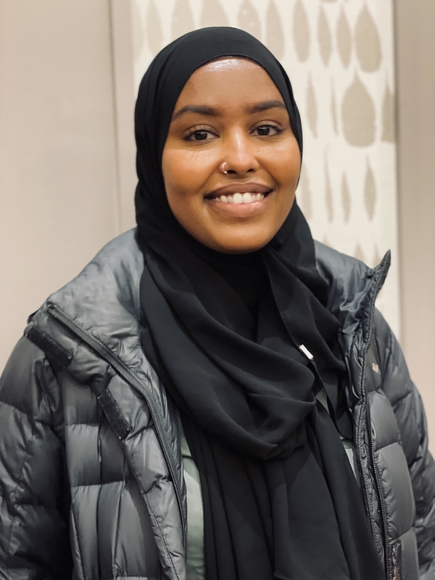First Generation Student Week
Throughout the week of November 8-12, the University of Minnesota joins other colleges across the U.S. in celebrating First Gen Week. Roughly 1 in 4 students at the University are the first in their families to attend college. Sagal Khalif, who plans to finish her BA in economics in 2022, shares her path toward college success.

When did you first think about attending college? What motivated your decision to pursue a degree?
When I started my schooling journey as a young child, I knew I wanted to attend college. I was a curious child, and learning came naturally to me. Being one of the youngest children in my family, I always wanted to learn new things to feel capable and knowledgeable about the world regardless of my age. I knew a higher education in conjunction with real-world experiences could prepare me to handle life experiences.
What was your path to college? Did you attend after high school or later in life?
As soon as I graduated high school, I attended the University of Minnesota the following fall. This path may seem ordinary, but my college journey was far from conventional. After completing my first two years of college, I took a four-year gap before returning to school.
Did you have any mentors or family who encouraged you to attend exploring higher education?
My parents did not attend college but still instilled in me the importance of pursuing higher education. After fleeing the civil war that broke out in Somalia in 1991, my family lived in Egypt for nine years, where I was born, before moving to the United States. They told me from a young age that I should take advantage of this country’s opportunities and that a college education can help me attain a better standard of living.
As you were thinking about applying and attending, did you have any help during the application process?
Even with the support of my parents in the pursuit of my college education, English was not their first language, so that came with its barriers in being able to provide help in the application process. However, I was fortunate to own a laptop in high school and navigate my way through the application process.
Did you face any obstacles getting into and adjusting to college life?
Adjusting to college was quite tricky for me. Achieving good grades from K-12 came quite easily for me and did not require that much effort. Being the child of immigrants, I was primarily responsible for guiding and translating documents, health matters, and various amounts of necessary paperwork. This responsibility, in turn, forced me to mature at a young age. Once I entered college, I assumed it would be more complex than high school and that I would just have to put in a little bit more effort -- I was utterly unprepared. Juggling my responsibilities outside of school with my coursework became increasingly overwhelming. I was unaware of all the resources that could help me succeed in college, and decided to take time off after seeing that my current structure was not working for me. Also, not knowing what I wanted to major in also affected my motivation to do well. Taking time off and deciding on what interests me has led me back to college and declaring my major in Economics. I took that time to get to know myself better, see the world around me better by traveling, and teach myself that just because something is difficult doesn’t make it impossible.
What are your fondest memories of college life so far?
My fondest memories of college life so far are actually within the difficulty of the coursework itself. It teaches you perseverance, problem-solving skills, and patience. These are great foundations in self-development and will equip you to tackle challenges that life throws at you post-graduation.
What advice would you have for first generation students?
Ask questions! To this day, I recall a memory during parent-teacher conferences in the third grade where my teacher told my parents I asked a lot of questions. I didn’t realize this before, but I think it prevented me from seeking help, so I tried to figure everything out myself. This avoidance in asking for help is counterproductive. If there are resources available to you and you think they could be helpful, use them! Asking questions does not may you weak or incompetent but is an excellent component of success.
What thoughts would you offer to others thinking of attending college?
College is not easy but, in my opinion, worth the investment. It’s completely okay not to have everything figured out. Don’t let an instance or a failure define you; use that as motivation to do better or develop a new plan. It’s okay to change your mind and pivot in your career choice.
Are you a first generation student or alumnus? Share your First Gen Story and advice!
Read an interview with Professor Tom Holmes, chair of the Department of Economics and a first-generation college student himself.


